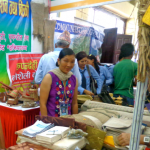by Stuty Maskey, 30/10/2012
Last month I attended a micro entrepreneurs’ trade fair in Kathmandu and met many micro entrepreneurs and home-based workers.
 Such fairs are one of the few opportunities that these rural communities get where they can come into direct contact with buyers as well as learn about market prices, competition and current demand. Many micro enterprises and home-based workers are located in remote areas inaccessible via roadways and most of the time their only contact to the market is through middle-men and traders who buy their products/raw materials in bulk. Having said that, participation in trade fairs is expensive for these home-run businesses, and it is only with sponsorship from an I/NGO that they can participate.
Such fairs are one of the few opportunities that these rural communities get where they can come into direct contact with buyers as well as learn about market prices, competition and current demand. Many micro enterprises and home-based workers are located in remote areas inaccessible via roadways and most of the time their only contact to the market is through middle-men and traders who buy their products/raw materials in bulk. Having said that, participation in trade fairs is expensive for these home-run businesses, and it is only with sponsorship from an I/NGO that they can participate.
PICTURE: Ekmaya displaying her products at the trade fair
This year, in the fair, I met a lady named Ekmaya Pun from a remote village in Western Nepal. Ekmaya brought with her locally-weaved Allo (Himalayan wild nettle) products namely bags, clothes, scarves and purses. By the last day of the fair she said the trip was ‘fruitful both on a personal level and on the business front’.
The indigenous process of Allo processing is a long and strenuous task. Here is what I learned from her about the process:First Allo is harvested from stingy bushes. After removing the dead bark, the inner bark is peeled off. Then the bark is cooked in hot water for up to 3 hours. The cooked fibers are then washed in rivers followed by beating the fiber with a wooden hammer for several hours. This process of washing and beating is done at least 3 times to get a good quality pulp. The pulp is then mixed with rice husk to make it soft and again washed and dried to remove the extra husk to prepare it for spinning. The fiber is then spun into yarn. Most of the time women use a hand-spindle and sometimes, where available, use spinning wheels. Ekmaya said she practices both methods to spin as a hand-spindle is portable even though it is tedious. Finally, the yarn is woven on back-strap weaving machines.

PICTURE: Left – Right: Allo scarf, fabrics, and wallets; Top: Bag and Allo Barks
In a rough calculation, to finish an item, say a scarf that is 1.5 x .25 meters, it takes on average 3 days for a worker to complete from collection stage to production. This assumes a work time of about 5 hours a day.
Allo has been harvested for generations in Nepal to extract fiber in order to make cloth. And the growing world demand for natural and environmentally friendly products means that these Allo products could increase opportunities for the rural economy in Nepal. The challenge is to ensure that this access to market does not lead to unsustainable harvesting and the adoption of techniques for increased production speed that takes away the organic nature of this age-old traditional system.
Ekmaya didn’t seem worried about the sustainability part. She thought that there were enough plants in the forests to last for generations when considering that these regenerate every year. But she did mention that the process was cumbersome, from cutting the thorny bushes to the long hours of bark-cooking. Thus some technology that could reduce this hardship would be great for rural Allo workers. She added that access to finance (especially without collateral) would be very helpful to encourage many others who wanted to start their own micro enterprises. And she quickly added that for now, she was keen to get back home and share her experience in the capital city, with her friends.
Photos: Stuty Maskey
Stuty´s previous contributions to Exploring Rurality can be found here:
Field reflection: Home Solutions for Global Concerns
Opportunities and challenges of market access for rural communities
STUTY MASKEY earned an MA in Public Policy from Oregon State University as a USAID scholar from Nepal and is an ICRPS alumna. She is currently working for a forestry programme jointly managed by the Government of Nepal and the Swiss Agency for development and cooperation. She is interested to understand and establish mechanisms to harness the economic potential of forest resources to address poverty and to ensure equitable benefits (environmental and economic) for the forest dependent communities
